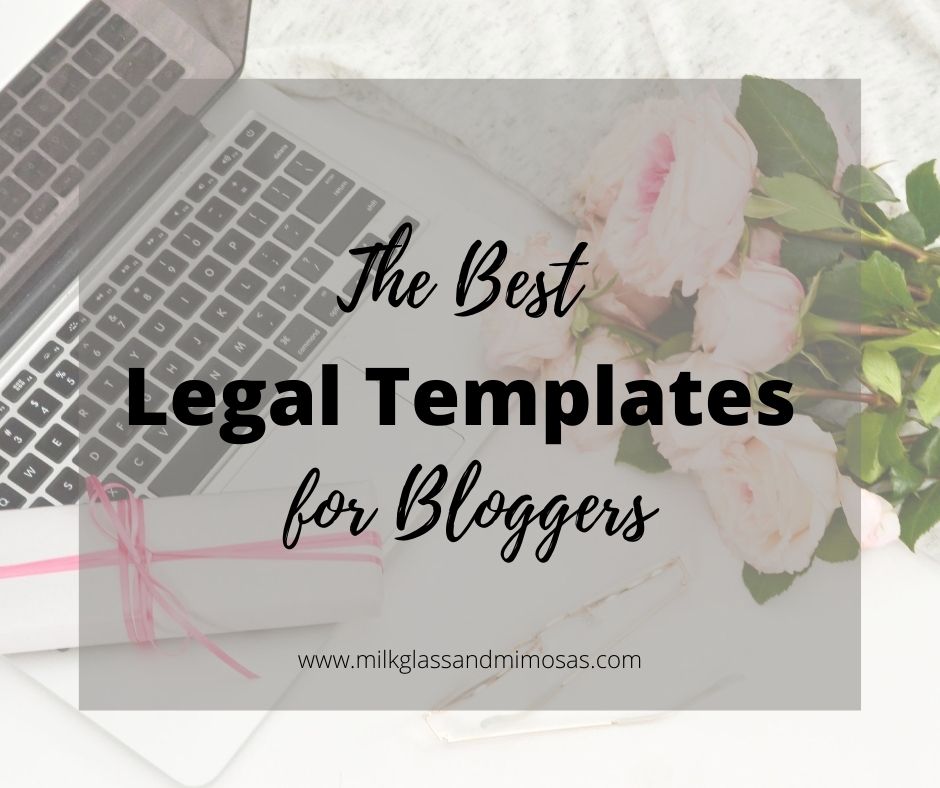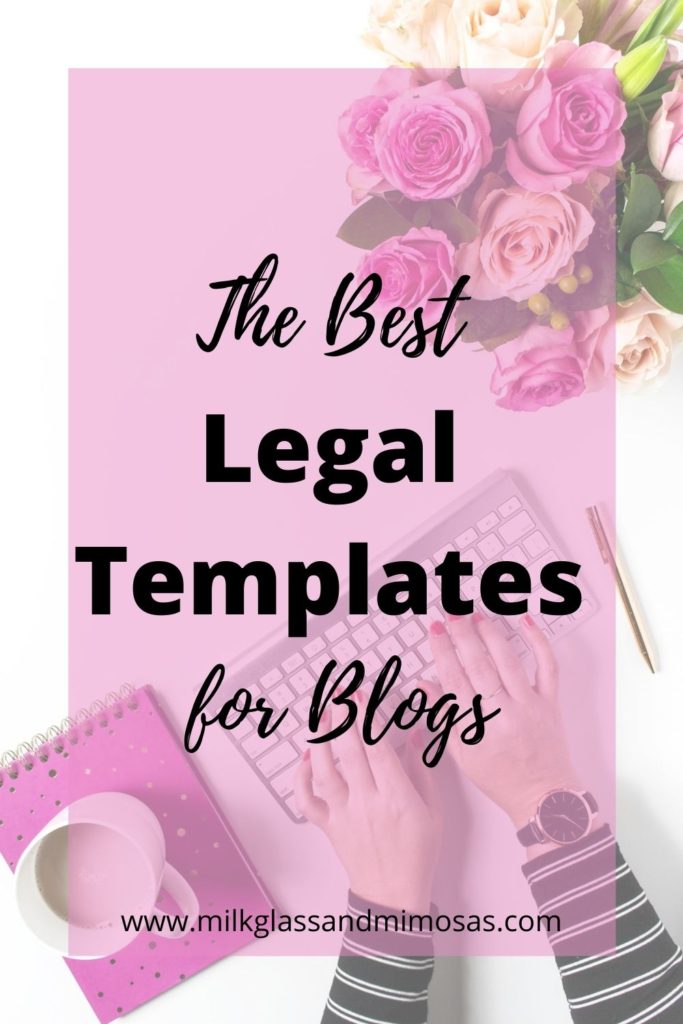This post contains affiliate links which means if you make a purchase, I receive a small commission at no additional cost to you. For more information, please read my disclosure policy.

Legal Pages for Blogs
When I first started blogging, I used free legal templates because I didn’t want to spend a lot of money up front. Of course, I thought I was doing the right thing by having the necessary legal pages, but didn’t worry too much about what they actually said.
It’s taken me a long time to take my blog seriously, but as I’m starting to make a little money from my blog, it was time to also cover my legal bases, too.
As I’m actively pursuing more traffic and monetization, I realized those free legal pages just weren’t going to cut it. First, the pages were last updated a few years ago. A lot has changed since I even created them. Second, I didn’t trust that they were from a source that actually knew what they were talking about.
Whether newbie or seasoned blogger, read on for some important information about legal pages for blogs.
Why do you need legal pages?
Disclaimer: I am not a lawyer and this is not legal advice. I am sharing my knowledge based on my individual research and experience.
The legal pages on your blog are required to protect you, your business and your readers. They protect you and your business from things such as lawsuits, copyright infringement and fines from the government. Legal pages protect your reader by basically letting them know the rules and regulations when visiting your site.
Bottom line: by investing in the required and appropriate legal templates for your blog, you can protect you and your reader from potential costly legal action now and in the future.
What legal pages do you need?
There are three required pages every blogger needs to have on their site. These include Terms and Conditions, Privacy Policy and Disclaimer.
Terms and Conditions
This page basically defines the rules for visiting your website. It tells your readers that they agree to these terms by visiting and using your site. The terms and conditions also include your privacy policy and disclaimer.
Privacy Policy
This page tells your readers what personal information is collected and how it is used when they visit your site. Since all websites collect data (i.e. names, email addresses, cookies), you need to explicitly tell your readers this.
There are also specific policies for UK and California residents, called GDPR and CCPA, respectively, that need to be included in your Privacy Policy page.
Disclaimer
A disclaimer basically states that you are not legally liable for the information you publish on your site. Even if you’re an expert in your field or do thorough research, it may not be completely accurate or appropriate for every reader.
For example, although I’m talking about legal pages in this article, I’m not a lawyer and I don’t claim this as legal advice. You are simply reading about my personal experience and research. My disclaimer lets you know this so there is no claim that I misrepresent myself or the information I provide.
Additionally, a disclaimer includes disclosure policies which let your readers know when you include affiliate links or sponsored content. This is so your reader can make an informed decision about the information you provide.
How to add legal pages to your blog
If the information above makes your head spin, I feel you! As I mentioned, I am not a lawyer and these legal pages are not something to take lightly.
If you don’t have the appropriate language in each of the required legal pages, you could face serious fines, lawsuits or be shut down completely. While this sounds scary, it doesn’t need to be. There are solutions that can help take the pressure off you and legally protect your blog and business.
I recommend investing in legal templates for your blog because they take the guesswork out of writing your legal pages. Legal templates include all the necessary language for each page and let you know where to fill in your information to personalize it for your business.
When I invested in legal templates, it took me about 30 minutes to complete all three pages and upload them onto my blog.
Legal Templates for Blogs

When I decided to invest in legal templates for my blog I was looking for two things: affordability and accuracy. I didn’t want to break the bank because I’m not making all that much money from my blog yet. At the same time, I also wanted my legal templates to be comprehensive and accurate. If I’m spending the money, they better do what they say they will do!
The Legal Bundle
I ultimately chose the Legal Bundle by A Self Guru because Amira, the creator of these templates, is both a lawyer and a blogger. She created these templates with both of her professional knowledge of the law and of blogging. How cool is that?!
In addition, I highly recommend these legal templates for blogs because they were so easy to use. Once you make your purchase, you can simply download the templates in Word and fill in the highlighted areas with your blog’s information. Each template has instructions at the beginning and walks you through what to expect.
Although the process of filling in the templates and uploading them can be done very quickly, I strongly suggest you take the time to read through the actual pages from beginning to end to know exactly what you are putting on your blog. Even if you don’t understand all the legalese, you should be familiar with your blog’s terms and conditions, privacy policy and disclaimer. You also want to make sure that you filled in every section completely and accurately – remember these are legal documents!
Then, you want to upload each completed template to your blog as an individual page. You can then add these pages in the footer of your blog. Some bloggers also have their legal pages available in their top menu bar, but not everyone has this anymore. The pages need to be visible and the most common place to access them is in the footer.
Additional Legal Templates for Blogs
The Legal Bundle I described above comes with the three main templates you need to start your blog legally, plus nine bonuses. Not only that, but you get free lifetime updates to these templates should any of the language change (and it will!)
If you are a more advanced blogger or want to start monetizing right away, you can upgrade to the Premium Legal Bundle which contains the three templates mentioned above plus three additional templates: sponsored posts contract template, independent contractor (freelance) contract template and guest blogger agreement template. This package also comes with thirteen bonuses!
I would definitely recommend upgrading to the Premium Legal Bundle if you want to grow and monetize your blog. Even if you aren’t there yet, grab these templates so you’re ready to go when you decide to expand your blogging goals. This is what I did and I’m so glad I did.
The good news is, if you decide to go with the basic package to start, you can also upgrade in the future. Once you’re a customer, you can upgrade to the next level bundle by just paying the difference.
Final Thoughts
It’s super important to have the necessary legal pages on your blog and investing in quality legal templates is the best way to do this. Trust your gut and go with templates from a real lawyer and blogger who knows what she’s doing.
I was so impressed by the Legal Bundle, I couldn’t wait to share it with others. It’s worth every penny of the investment by giving me peace of mind that my legal bases are covered.
Blogging is a fun and enjoyable side-hustle, but it can be costly if you get into legal trouble. At the end of the day, having one less thing to think about by using quality legal templates for your blog can save you time and money.
Like anything in life, do your own research and know what you need to do for your business. Once you are ready to invest in legal templates, check out the Legal Bundle. It’s definitely worth it in my book.
Have questions about the legal templates for your blog? Let me know in the comments below.